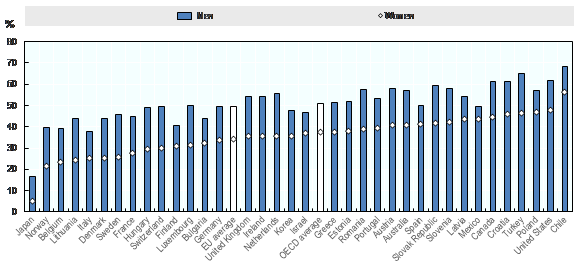Inclusive Entrepreneurship
Is the gender gap in entrepreneurship closing?
Women are under-represented in entrepreneurship. In 2018, women were about 60% as likely as men to be self-employed in the EU and this gender gap starts young. Young women (20-29 years old) were also about 60% as likely to be self-employed as young men. While the gender gap closed slightly across all age groups since 2002, it was due to a decline in male self-employment rather than growth in female self-employment.
The gender gap in entrepreneurship can be explained by a range of factors, including social attitudes towards women in the labour market, different motivations and intentions in entrepreneurship, and different and greater barriers to business creation (e.g. a lack of entrepreneurship skills, failures in financial markets).
Women are less likely to indicate that they have entrepreneurship skills
Share of the population reporting that they have the skills and knowledge required to start a business (18-64 years old), 2014-18

Note:The figure shows the proportion of respondents who self-reported that they had the skills and knowledge to start a business. All EU and OECD countries participated in the GEM survey between 2014 and 2018 except the Czech Republic and Malta. Several countries did not participate in the survey in every year: Australia (2018), Austria (2015, 2017), Belgium (2016-18) Bulgaria (2014), Cyprus (2014-15), Denmark (2015-18), Estonia (2018), Finland (2017-18), France (2015), Hungary (2017-18), Japan (2015-16), Korea (2014), Latvia (2014, 2018), Lithuania (2015-18), Mexico (2018), Norway (2016-18), Portugal (2017-18), Romania (2016-18), Turkey (2014-15, 2017).
Source: Global Entrepreneurship Monitor (2019), Special tabulation of the population surveys bewteen 2014 and 2018.
Policy makers frequently use tailored policies and programmes to encourage and support women in entrepreneurship. Common approaches include promoting female entrepreneurship role models; offering entrepreneurship training, coaching and mentoring; and targeted financing programmes (e.g. grants, microcredit).
Many countries are developing new policy approaches that more tailored support for growth-oriented women entrepreneurs. These include dedicated business incubator and accelerator programmes for women entrepreneurs and building dedicated risk capital infrastructure. However, policy needs to do more to cultivate women’s entrepreneurial aspirations, address market failures in the areas of skills and finance, and improve access to networks and support for growth-oriented entrepreneurs.
Further reading
The Missing Entrepreneurs 2019
Policy Brief on Women’s Entrepreneurship Policy
- Background paper on women’s entrepreneurship
Supporting Women Entrepreneurs in Germany
Supporting Women Entrepreneurs in Ireland
Inclusive Business Creation: A good practice compendium
Related Documents